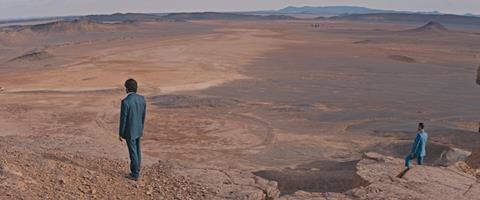The adventures of Casablancan debt collectors take a sharp turn in Fauzi Bensaidi’s disorienting drama

Dir/scr: Faouzi Bensaïdi. France/Germany/Morocco/Belgium. 2023. 124mins
A droll, slapstick buddy movie about the fractious friendship between a pair of Casablanca debt collectors morphs midway through the film into something completely different: a brooding fable-like story of doomed love and wrongful imprisonment. It’s certainly a bold formal decision from Faouzi Bensaïdi (Mille Mois). But the transition between the two co-existing stories is disorientating; the contrast in tones is more jarring than complimentary and, most crucially, the picture runs out of steam long before it draws to a close.
The early scenes show considerable promise
It’s a pity, because the early scenes show considerable promise, combining moments of wry, impeccably choreographed physical comedy with gentle absurdity in a way that evokes the work of Elia Suleiman (perhaps not coincidentally – Bensaidi had a cameo acting role in Suleiman’s 2019 picture It Must Be Heaven). It’s not even that the second, more mythic storyline is unsuccessful (although, with its long wide shots of characters staring at the arid drama of southern Morocco’s deserts, it is something of an endurance test); more that the two elements simply don’t mix.
This is the sixth film from Casablanca-based director Bensaidi, who premiered his debut Mille Mois in Un Certain Regard 2003, taking home several prizes. Other credits include Volubilis, which premiered in Venice Days, 2017; and Baya Al Maut, which won the C.I.C.A.E prize in Berlin, 2012. Deserts will likely be most warmly received on the festival circuit, where audiences might be more open to its unconventional structure and tonal shifts. It may, however, struggle to connect within other markets.
The two principal characters, of the first half of the film at least, are Mehdi (Fehd Benchemsi) and Hamid (Abdelhadi Taleb). Dressed almost identically in slightly dishevelled blue suits, carrying a worn leather briefcase, they drive around the isolated and desperately poor villages of the Moroccan south, in a sandblasted burgundy Renault. Bensaidi makes the most of every last inch of Florian Berruti’s widescreen cinematography, favouring long, unbroken takes that fill with little details the longer you look at them.
The men are employed by a debt collection agency, but they have a side hustle – selling the goods confiscated as part payment, and pocketing the cash. A series of episodic vignettes reveals a little of the private lives of each: Hamid’s wife has walked out on him, leaving him to look after their daughter. His mother, who has unwillingly shouldered the childcare responsibilities, suggests selling the girl via an adoption broker she met in the market. Mehdi is courting, but his demure fiancee comes with an incorrigible boozer of a father and a shrill harridan of a mother.
The link between the first storyline and the second is a meeting between the men and a grieving motorcyclist who has an escaped criminal (Rabii Benjhaile) handcuffed to the back of his bike. They agree to take the outlaw to the authorities in return for payment, and then they promptly disappear from the film for a good 20 minutes. The focus of the story shifts to the criminal, who steals the car and returns to his village to claim his true love, exact revenge on the man who stole her from him – and stand motionless for extended periods, dramatically silhouetted against various bits of scenic backdrop. Mehdi and Hamid do eventually pop up in the story again. But without their car they, like the film, have pretty much ground to a halt.
Production company: Barney Productions
International sales: Urban Distribution International sales@urbangroup.biz
Producer: Saïd Hamich Benlarbi
Cinematography: Florian Berruti
Editing: Véronique Lange, Faouzi Bensaïdi
Production design: Véronique Sacrez
Main Cast: Fehd Benchemsi, Abdelhadi Taleb, Rabii Benjhaile
























